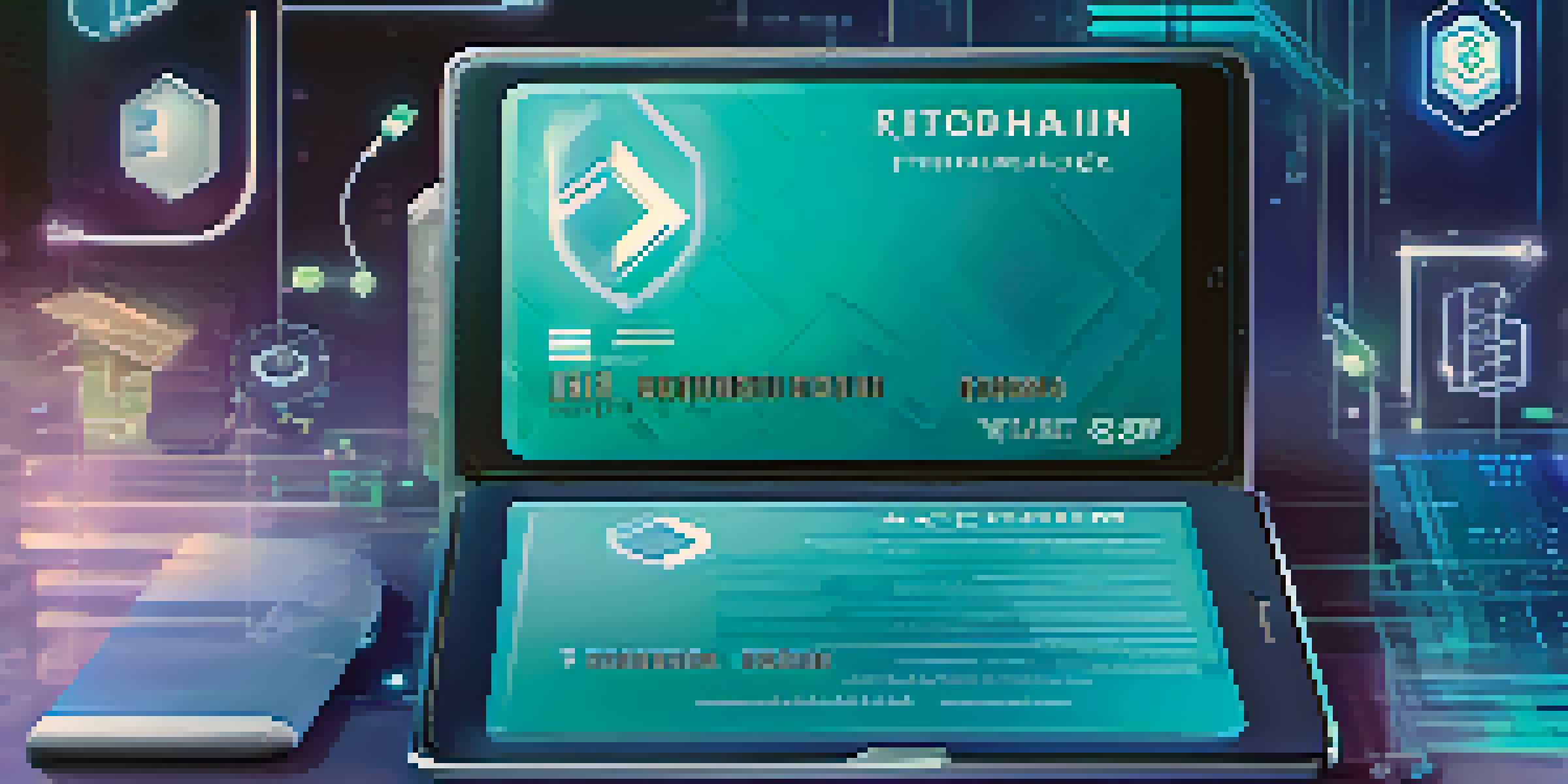Decentralized Identity: A Future Built on Ethereum's Blockchain

Understanding Decentralized Identity and Its Importance
Decentralized identity is a revolutionary concept that shifts control of personal data from centralized authorities to individuals. In a world where data breaches are commonplace, this approach enhances privacy and security. By using blockchain technology, particularly Ethereum, users can manage their identity without relying on traditional systems.
With great power comes great responsibility.
Imagine carrying a digital ID that you control, much like a physical wallet where you choose what to show and what to keep private. This idea not only empowers users but also reduces the risks associated with identity theft. As more services integrate decentralized identity solutions, the need for a secure and user-friendly system becomes clear.
With Ethereum’s blockchain, each identity can be represented as a unique token, ensuring authenticity and integrity. This innovation is paving the way for a future where users can share their information selectively, creating a safer digital environment.
How Ethereum's Blockchain Enables Decentralized Identity
Ethereum's blockchain offers a robust infrastructure for decentralized identity through smart contracts. These self-executing contracts automate processes, ensuring that identity verification is both secure and efficient. Each interaction with a smart contract is recorded on the blockchain, creating an immutable history that enhances trust.

For example, when you verify your identity with a service, a smart contract can confirm your credentials without needing to disclose sensitive information. This not only speeds up the verification process but also minimizes the risk of data leakage. Smart contracts act like digital notaries, ensuring that each transaction related to your identity is recorded accurately.
Decentralized Identity Empowers Users
Users gain complete control over their personal information, enhancing privacy and reducing the risk of identity theft.
As more developers build identity solutions on Ethereum, the ecosystem grows richer and more diverse. This collaborative effort is crucial in establishing standards and protocols that will shape the future of decentralized identity.
Benefits of Decentralized Identity for Users
Decentralized identity offers numerous benefits, starting with enhanced privacy. Users have complete control over their personal information, deciding who can access it and under what circumstances. This empowerment is a refreshing change from traditional systems where third parties often mishandle or misuse data.
The greatest danger in times of turbulence is not the turbulence; it is to act with yesterday's logic.
Another significant advantage is improved security. By eliminating centralized databases, the risk of mass data breaches is substantially reduced. Users can store their credentials securely on the blockchain, making it much harder for malicious actors to compromise their identities.
Finally, the convenience of managing identity through a single digital wallet simplifies user experience. Imagine having all your credentials—IDs, memberships, and certificates—accessible in one place, allowing for seamless interactions across various platforms.
Challenges in Implementing Decentralized Identity
Despite its benefits, implementing decentralized identity faces several challenges. One major hurdle is the need for widespread adoption among businesses and users alike. For decentralized identity to be effective, a critical mass of participants is required to create a network of trust.
Another challenge lies in the regulatory landscape. Governments and organizations must navigate existing laws while developing frameworks that support decentralized identity solutions. This balancing act is essential to ensure compliance without stifling innovation.
Ethereum Enhances Identity Security
Smart contracts on Ethereum provide secure and efficient identity verification while minimizing data leakage.
Finally, user education plays a crucial role in the adoption of decentralized identity. Many individuals are still unfamiliar with blockchain technology, making it essential to create accessible resources that explain its benefits and functionalities.
Real-World Applications of Decentralized Identity
Several industries are already exploring decentralized identity solutions, showcasing its potential. For instance, the healthcare sector can benefit from secure patient records that individuals control, allowing for better privacy and data sharing. Patients could grant access to their medical history without compromising their entire identity.
In the financial sector, decentralized identity can streamline onboarding processes. Banks can verify customers’ identities quickly and securely without requiring extensive paperwork. This efficiency not only saves time but also enhances the customer experience.
Moreover, the education sector is beginning to utilize decentralized identity for credential verification. Graduates can share their degrees and certifications securely, reducing the risk of fraud and making the hiring process smoother for employers.
The Role of Decentralized Identity in Digital Trust
Decentralized identity is pivotal in fostering digital trust, a crucial component in today’s online interactions. By allowing individuals to control their data, users can build trust with various services they engage with. This shift from centralized to decentralized systems prioritizes user autonomy and transparency.
Furthermore, as users regain control over their identities, they are more likely to engage with platforms that respect their privacy. This creates a positive feedback loop, where businesses that prioritize decentralized identity gain a competitive edge in the market.
Adoption Challenges Remain Ahead
Widespread adoption, regulatory navigation, and user education are crucial for the successful implementation of decentralized identity.
Ultimately, decentralized identity empowers users to take ownership of their digital lives, paving the way for a more trustworthy internet. This transformation is essential as we navigate an increasingly interconnected world.
The Future of Decentralized Identity on Ethereum
As we look to the future, decentralized identity on Ethereum is poised for significant growth. Ongoing development in the Ethereum ecosystem, including scalability improvements and interoperability with other blockchains, will enhance its functionality. These advancements will enable broader adoption and integration of decentralized identity solutions across various sectors.
Moreover, as society continues to grapple with data privacy issues, the demand for decentralized identity systems will only increase. Organizations that embrace this technology will not only protect user data but also position themselves as leaders in privacy-centric solutions.

In summary, the future of decentralized identity on Ethereum is bright, offering a transformative approach to identity management that prioritizes user control, security, and trust.